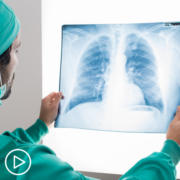Expert Advice for Creating an Optimized Lung Cancer Treatment Plan
Expert Advice for Creating an Optimized Lung Cancer Treatment Plan from Patient Empowerment Network on Vimeo.
What lung cancer treatment factors are considered in creating a treatment plan? Dr. Lecia Sequist explains factors that play a role in an optimized treatment plan and advice to patients to help ensure their best care.
Dr. Sequist is program director of Cancer Early Detection & Diagnostics at Massachusetts General Hospital and also The Landry Family Professor of Medicine at Harvard Medical School.
[ACT]IVATION TIP:
“…bring someone with you when you go to the oncologist office. It’s always best to have another pair of ears listening to the information that’s being presented to you, but also to get another viewpoint about how is this treatment going to work in your life, how are we going to be able to get back and forth to the appointments? Are there other options, are there other satellite sites that the hospital might have that are easier for you to get to?”
Download Resource Guide en español
See More from [ACT]IVATED NSCLC
Related Resources:
Transcript:
Lisa Hatfield:
Dr. Sequist, I know there are many factors that go into developing a treatment plan for patients. How do you work with your patients to develop the best treatment plan for an individual patient?
Dr. Lecia Sequist:
That’s a great question. It really is different for every patient. But I think the general steps are for me to make sure that I understand the complete picture about the patient’s cancer. And that usually means a biopsy, several types of radiology scans. Genetic testing of the tumor is often done for lung cancer. And then I definitely talk to my colleagues who give different types of treatment. So I give drug treatments. I’m a medical oncologist. But I work with colleagues who are surgeons and I work with colleagues who are radiation oncologists. If I have any questions about some of the data, I also ask, you know, if I’m not sure about what the scans are showing, I really, it’s important to talk to radiologists who are experts in reading those scans so that we really make sure there’s no gray areas, we understand what’s happening. If I have questions about the biopsy, I talk with the pathologists. So on my end I have to talk to a lot of different colleagues to make sure that I understand the patient’s situation when it comes to their cancer. But it’s also really important to understand the patient’s situation when it comes to their life.
So for that, the patient is the expert and it’s really important for me to understand where they live, who do they live with, what are the things that are challenging for them at home? For example, do they have a lot of stairs to go up and they’re having trouble breathing, or do they live really far from public transportation and they don’t have a car, what are the…they might work certain days or certain hours, or they have childcare responsibilities on certain days or certain hours. So I need to have an understanding of what their life is like too, so that we can figure out what’s the best treatment that will fit into their life, and if it’s goin to not fit so nicely into their current daily routine, how can we help them temporarily change their daily routine so that they can get through the cancer treatment.
All these things are really important. And so if there’s other experts on the patient’s side too, like family members or caregivers, those…it’s really important to engage all these different people to come together to find the best plan for that patient. So my activation tip for this question is to bring someone with you when you go to the oncologist office. It’s always best to have another pair of ears listening to the information that’s being presented to you, but also to get another viewpoint about how is this treatment going to work in your life, how are we going to be able to get back and forth to the appointments? Are there other options, are there other satellite sites that the hospital might have that are easier for you to get to?
Do they have weekend hours? If weekends are easier for you to go for some treatments or tests. There are lots of different things that are out there, and it’s hard for any one person to think of all the questions. So if you bring someone with you, it’s always helpful.






